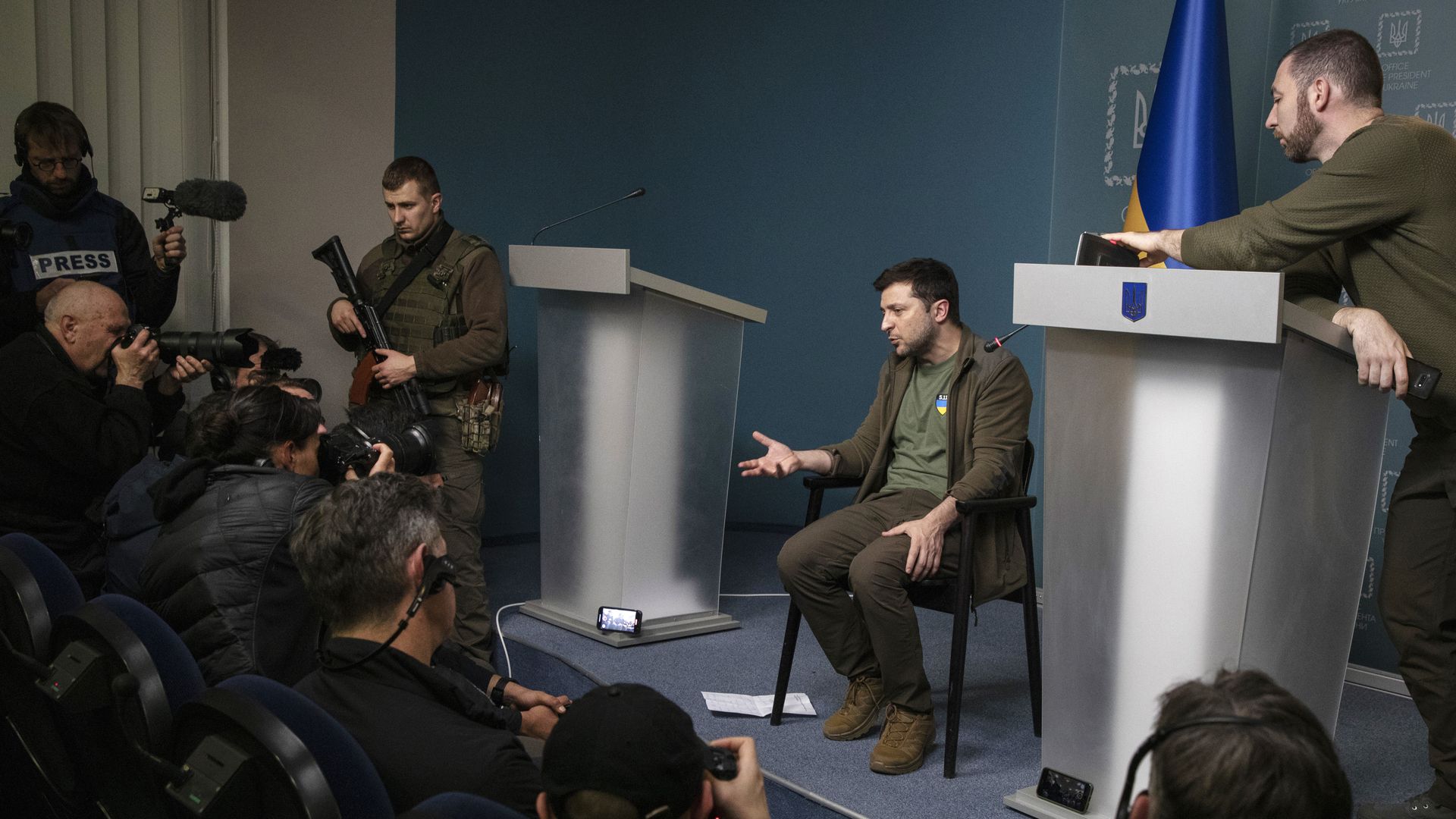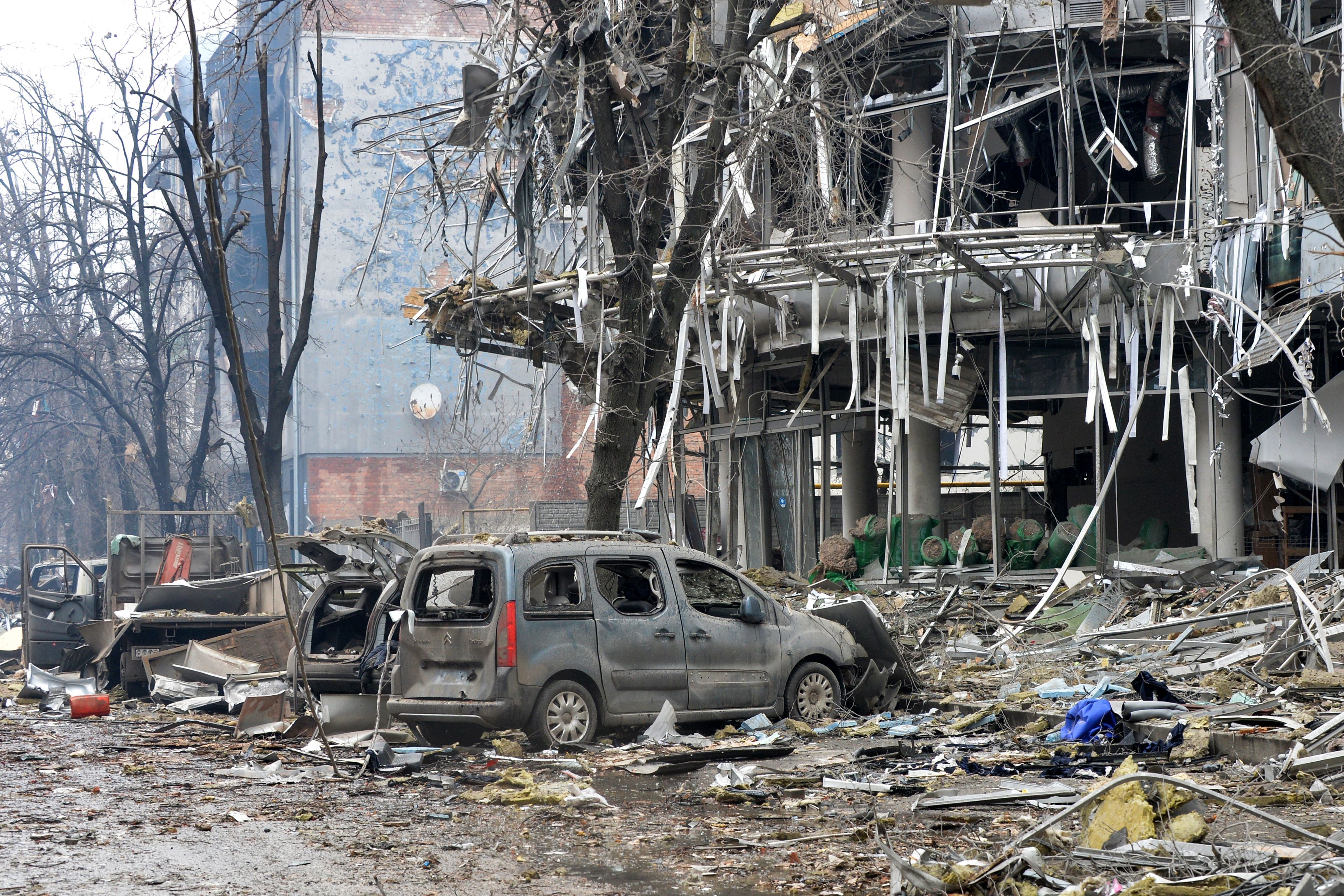Russia lays siege to major cities as Ukraine seeks safe passage for civilians
Add Axios as your preferred source to
see more of our stories on Google.

Ukrainian President Volodymyr Zelensky at a press conference on March 3. Photo: Laurent Van der Stockt for Le Monde/Getty Images
Russian forces seized Europe's largest nuclear plant in an overnight assault that caused a fire at a nearby training facility, briefly raising fears of a nuclear disaster on top of the devastating humanitarian crisis already unfolding across Ukraine.
Driving the news: The fire has been extinguished and there are no signs of a radiation spike, according to Ukrainian and UN officials. Ukrainian President Volodymyr Zelensky said Friday will be a test of whether Russia is serious about establishing the "humanitarian corridors" that the two sides agreed to in Thursday's peace talks.
The latest: Ukraine and Russia plan to hold a third round of peace talks this weekend, according to a Zelensky adviser.
- The Pentagon assesses that Russia has launched more than 500 missiles but failed to gain air superiority after nine days of war. A large Russian force is about 15 miles from Kyiv but has not advanced significantly in the past few days, a senior defense official told reporters.
- The U.S. and Europe continue to deliver weapons to Ukraine, thus far without any interference from Russia, the official said. The official accused Russia of "recklessness" over its assault on the power plant but said there were no signs of radioactive leakage.
- The U.S. and its allies at an emergency UN Security Council meeting on Friday condemned Russia's attack and seizure of the Zaporizhzhia nuclear power plant, calling the assault a breach of international law. "The world narrowly averted a nuclear catastrophe last night," Linda Thomas-Greenfield, U.S. ambassador to the UN, said.
- The UN Human Rights Council earlier Friday voted 32-2, with 13 abstentions, to establish a Commission of Inquiry to investigate Russia's aggression and possible human rights violations in Ukraine.
Meanwhile, Russia continued its crackdown on the free press and free speech on Friday.
- It blocked access to Facebook, and Russian lawmakers approved a law that threatens to imprison journalists and individuals for up to 15 years if they publish what Moscow deems to be "fake" information about Russia's invasion of Ukraine.
- The BBC said it would stop its news operations in Russia because of the law.
What they're saying: After a NATO meeting on Friday, Secretary-General Jens Stoltenberg once again rebuffed calls from Ukraine to set up a "no-fly" zone and said Russia has used "cluster bombs" in violation of international law.
- Ukraine Foreign Minister Dmytro Kuleba, who participated in the NATO meeting, thanked the allies for their support but called on them to do more.
- "We will continue fighting, but help us. If you don't, I'm afraid you will have to share responsibility for the lives and suffering of civilian Ukrainians who died because of ruthless Russian pilots who throw bombs on them," Kuleba said.
- "Russia tries to turn Ukraine into Syria, and the tactics they deploy are very similar to the ones they excelled at in Syria. But we should not allow them to create Syria in Europe."
The big picture: The Russian military's underperformance and inability to claim air superiority one week into the invasion remain "inexplicable," but may not change the outcome of the war due to sheer force of numbers, according to the Institute for the Study of War.
Zoom in: Russian forces are engaged in four primary lines of attack that have seen varying degrees of success and brutality. Of the forces Russia had massed on the border, 90% are now deployed in Ukraine, according to a senior U.S. defense official.

1. Russia's primary goal continues to be the encirclement of Kyiv, the northern capital where Zelensky and his team have bunkered down amid hourly air raid sirens.
- The menacing 40-mile Russian convoy captured on satellite imagery (see video below) has been "stalled" about 19 miles north of Kyiv for several days due to food and fuel shortages, muddy roads and Ukrainian attacks, according to U.S. and U.K. officials.
- Low morale among Russian troops — including inexperienced conscripts who "weren't even told they were going to be in combat," according to one U.S. official — is also believed to be a contributing factor.
- Still, the numbers are in Russia's favor. Asked if the Ukrainian forces could fend off the Russians, Zelensky admitted Thursday, "I don't know."
2. Russian forces are also encircling Kharkiv, Ukraine's second city near the Russian border.
- They have bombarded civilian areas and appear to be preparing for a siege but have faced fierce resistance in a week of heavy fighting.
- "Kharkiv today is the Stalingrad of the 21st century," Zelensky said, accusing Russia of "undisguised terror."
3. In southern Ukraine, Russian forces have surrounded the strategic port city of Mariupol and engaged in a continuous assault for more than 30 hours.
- The city of 400,000 has no electricity or water and has been completely blockaded, according to the deputy mayor, who estimated 200 civilians have been killed but said, "We cannot collect all the bodies."
- Seizing control of Mariupol would advance Russia's longtime goal of building a "land bridge" connecting occupied eastern Ukraine to Crimea.

4. West of Crimea, the mayor of the port city of Kherson conditionally surrendered to Russian troops — making it the first major population center to fall.
- The capture of Kherson will allow Russian forces to continue their advance toward Mykolaiv and Odessa, which — if successful — would completely cut off Ukraine's access to the seas, according to ISW.
- A senior U.S. official cautioned that the Pentagon has seen no indication yet of Russian forces advancing toward Odessa, but that they may seek to assault the historic Black Sea port by both ground and sea.
By the numbers: More than 2,000 civilians have been killed, according to Ukraine's State Emergency Service — although the true total is likely to be far higher.
- The estimates for troop casualties vary drastically — Zelensky claims more than 9,000 Russian troops have been killed, while the Russian Ministry of Defense put the figure at 498 on Wednesday.
- More than 1.2 million refugees have left Ukraine, according to the UN.
- Thousands of people are also rushing to flee Russia ahead of this weekend, as rumors swirl that Putin could soon declare martial law, close the borders and crack down even harder on domestic dissent.
What to watch: CNA’s Michael Kofman says that Thursday may have been a "turning point" in terms of Russia's use of air power, which has been "sporadic" so far. He expects more airstrikes as Russia grows frustrated.
Worth noting: EU foreign policy chief Josep Borrell said Friday that the bloc's sanctions were not intended "to provoke regime change in Russia," weighing in on a debate that has begun among Western officials and analysts.

Go deeper:

